Our research groups focus on diversity, equality, and inclusion
Several research groups at VUB focus on diversity, equality, and inclusion. For example, the RHEA centre of expertise, the BIRMM network and the Hannah Arendt Institute conduct leading scientific research on themes such as gender, diversity, migration, and minorities.

RHEA
RHEA is an interdisciplinary, interfaculty, and international research group which conducts scientific research on gender, diversity, and intersectionality within VUB. Intersectionality indicates the importance of gender inequalities in interaction with other themes, such as ethnicity, sexuality, religion, class, job skills, and age. RHEA also offers bachelor, master and doctoral programmes on gender, diversity and intersectionality and gives internal and external advice on equal opportunities and diversity policy. RHEA is a continuation of the Centre for Women's Studies, which was founded in 1987 at VUB as the first academic centre for women's studies in Flanders.
BIRMM
The Brussels Interdisciplinary Research Centre on Migration and Minorities (BIRMM) brings together over 100 VUB researchers from 11 disciplines. They deal with such themes as migration, minorities, and diversity. Some of the research projects: migration regulation and policing in the 19th century, political representation of ethnic minorities and differences in cancers among people with a migration background.
Researching the demographic challenges of the 21st century
The major demographic challenges in our society give rise to many new, relevant research topics and questions. They are the subject of BIRMM's first strategic research programme. Among other things, the researchers study the role of migration in demographic challenges and look at such aspects as health, family life, education, and careers within migrant groups.
Hannah Arendt Institute
Our diverse and rapidly changing society provides us with opportunities and challenges at the same time. The Hannah Arendt Institute, a partnership between VUB, the university of Antwerp and the city of Mechelen, wants to use both to strengthen society. Researchers do this by connecting scientific knowledge with insights and experiences of policy makers, organisations, and citizens. In this way, the institute provides answers to questions such as:
- How can a local authority promote social cohesion in districts and neighbourhoods?
- How do you set up an organisation in the multicultural labour market?
The scientific insights that the institute develops around these questions flow through to practice.
Research on newcomers and social networks
The Flemish Government wants to offer integrating persons a tailor-made programme in the form of a buddy project, volunteer work, an introductory traineeship at a company, community work centre, residential care centre, etc. These programmes help newcomers develop social contacts and actively participate in society. The Hannah Arendt Institute is investigating how best to go about this and is developing a policy and practice report with good practices and recommendations on social networks and the integration of newcomers.